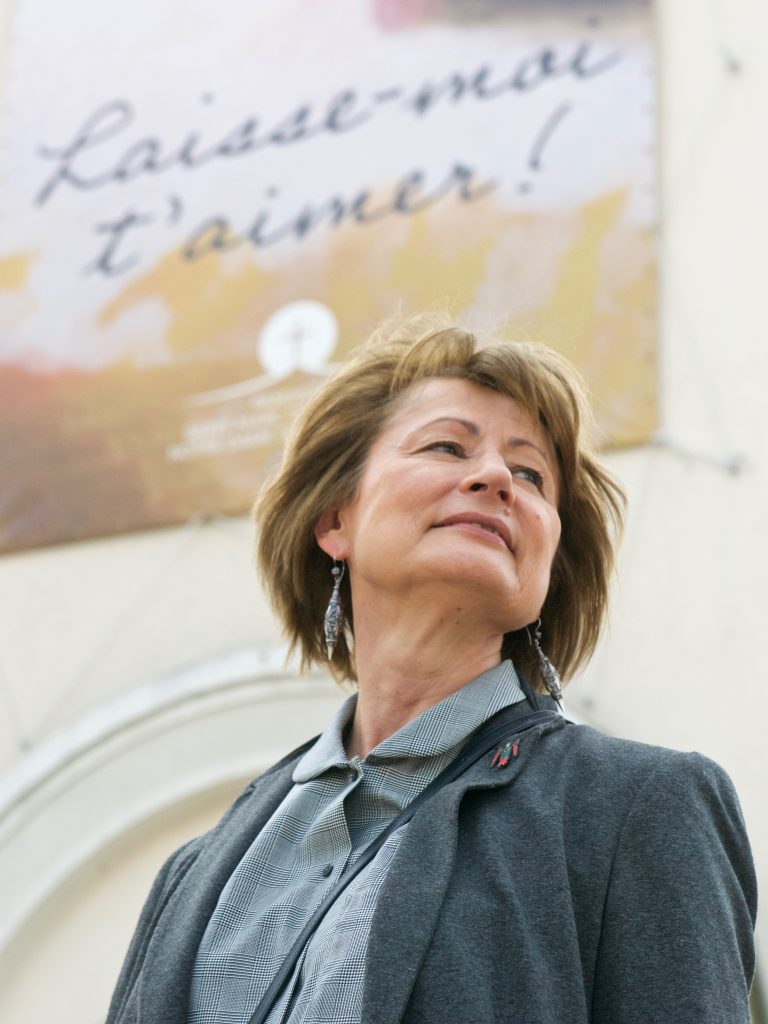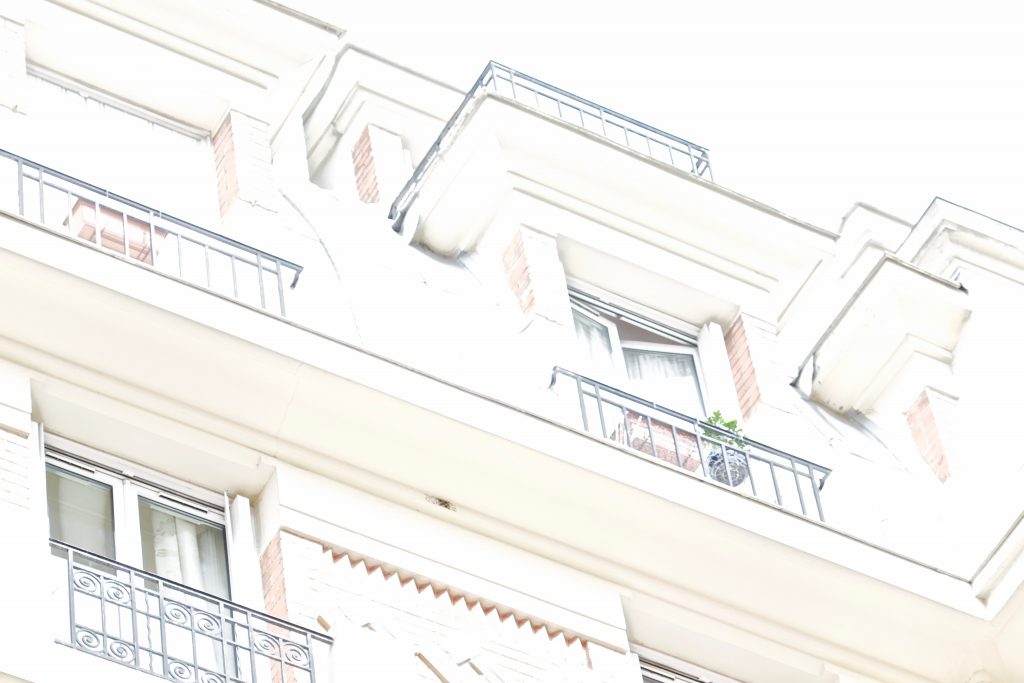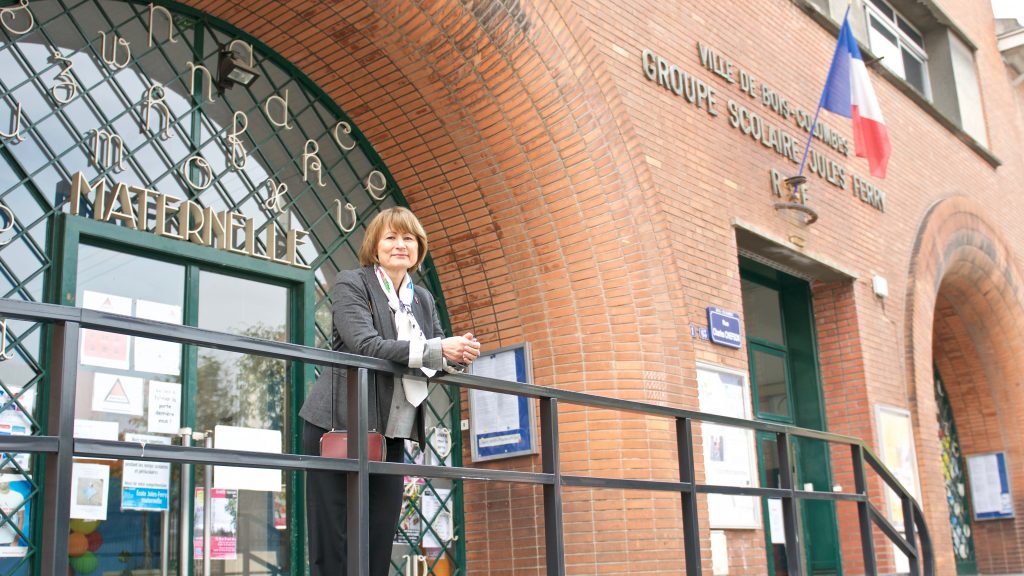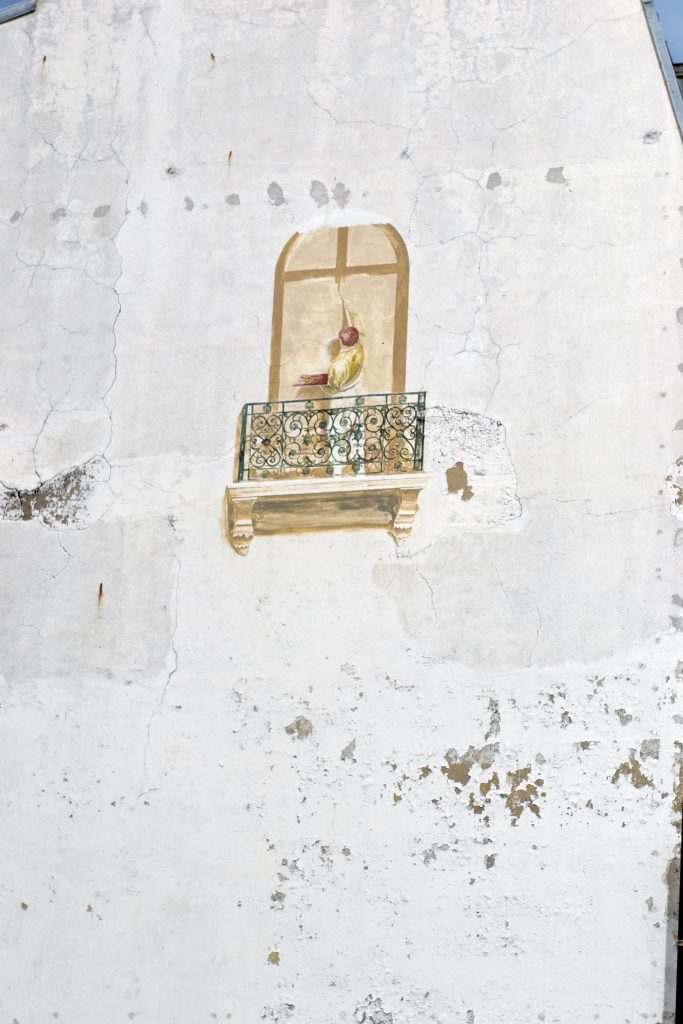Her book The sexual life of Catherine M. took the world by surprise and made her world-famous overnight. Since then, Catherine Millet has been one of France's most widely read writers. In her most recent novel A dream life she returns to her childhood in Bois-Colombes. A Quattro Mani went with her to the seed of her authorship.

Back to Bois-Colombes
It is quiet in the Place de la République, the central square of Bois-Colombes. The copper-green bell tower of the town hall warms itself in the morning sun, while a mother and her baby perch by the cheerfully gurgling fountain - the little boy waddling enthusiastically towards a duck, which just as waddlingly makes its way out. The colourful flowerbeds are pretty and colourful. It seems as if they want to entice visitors with all their splendour.
'In December, I gave a talk here,' Catherine Millet says, pointing to the terraced building behind her. 'I was invited to come and talk about my book. It was very busy, the room was full of nice people. It was the first time in a long time that I set foot in Bois-Colombes again. I last drove the road there years ago when my mother was alive.'
Frank
Catherine Millet is art critic, founder and editor-in-chief of the leading art magazine Art Press and essayist. Outside France, she is best known as a writer on subjects other than art. In 2001, Millet published the autobiographical book The sexual life of Catherine M. Frankly and soberly, she described her unbridled sexual escapades, and all the ways and positions she found herself in with one or more men at the same time, at parties, in the Bois de Boulogne, in clubs or rooms. The book hit like a bomb: never before had a woman written so bluntly about sexuality and lust. 'The reactions were overwhelming and mostly very positive,' Millet recalls. 'Many women felt empowered. The book was translated into forty-five languages and sold several million copies. I travelled all over the world and had the time of my life.'

Then appeared Jealousy, about the devastating power of jealousy that held her hostage after discovering that her husband Jacques Henric was also quite promiscuous. And this year appeared A dream childhood, in which Millet describes her youngest years, her family of origin. The strength of Millet's prose is its unaffected, down-to-earth style of description, observant and matter-of-fact, devoid of emotion, so it never becomes larmoyant - witty, that is.

'Look, that's where I was born,' she points to number 1 Rue Philippe de Metz, a tall brown-and-white brick building in a quiet street of this Parisian suburb. We drove from the unusual modernist station along Rue des Bourguignons, the dividing line between Bois-Colombes and Asnières, to the house where she came into the world in 1948. A two-room flat, where she lived with her mother, father, grandmother and later her little brother. Catherine slept next to grandma, in a trundle bed in the living room that was pulled out every night.
Afgeranseld
Father had not been the same since he returned from the war, a war that continued at home between him and his wife - mentally, but sometimes physically. There was drinking, cheating, beating. 'Oh yes, there have been so many policemen here in the street...' says Millet cheerfully, who herself was regularly beaten by her brother.
Not a time to like to return to, you would expect, so why did she write a book about it? Millet laughs. 'My publisher asked for it,' she confesses. 'In Jealousy included a chapter about my teenage years. After the publication of that novel, not only my publisher but also friends asked me to write about my early childhood. Since I was in Jealousy had already written about my youth, perhaps there was an inner need after all. As a person I look forward, as a writer I look back: I want to tell about a normal life in a certain time, as part of history, our history.'
Psychological violence
'My childhood was not exceptional; there were so many children who suffered blows at home or lived in a family with psychological violence. Who are they, how did they live, what were their desires, who did they love? I wanted to bear witness not so much for myself, but for a whole generation. My personal goal is to become liberated. Life can be pretty heavy, and I don't want to carry all that weight all the time. As soon as something is on paper, I am freed from it and feel lighter. Even though what I write is autobiographical, when the book is completed, that girl Catherine has become someone other than myself.'

We walk past her primary school with two arched doors. A procession of little ones is just marching in. In her novel, she remembers the headmistress as 'an amiable, dignified woman who emphasised her authority with a prominent bosom that, like my grandmother's, plumply filled her high-necked blouse', a silhouette you don't often come across these days, she adds delicately. 'I loved going to school. When I started this book, I called the headmaster to ask if I could come and see it. Everything was exactly as it was then, the corridors, the doors, nothing had changed, only everything was so small!'
Through writing, she remembered everything again, was for a moment that girl again. 'But once it was written down, my true memories were replaced by the descriptions from my book, the translation I gave it. Do you understand what I mean? It is as if a screen has come to stand between my memories and my soul. That screen is the book.'
Suicide
Things did not end well with the Millet family. After Catherine's brother died in a traffic accident when he was twenty-one, her parents decided to split up. Her father later died of lung cancer; her mother eventually committed suicide. At her funeral, Catherine was the only close family member to walk in front.

Nevertheless, Millet won the title A dream childhood not only meant ironically, she tells us as she takes us to the church and the old railway line. A new line has made it disused and overgrown with grass. For her as a little girl, these rails symbolised a different life, a different future. 'These are places I loved coming to. I could dream away there endlessly.' Because that was what Catherine did to escape everyday reality. She resorted to faith, but mostly to stories. 'Fiction served as a shelter that I always carried with me, like the turtle's shell that protects it,' she writes in her book.
Funny stories
By writing A dream childhood Millet has come to realise that her childhood was not just miserable for herself. 'As a child, I suffered because my parents fought with each other. I loved them both equally - and they me - and it was my deep desire to make sure they loved each other again. Clearly, I did not succeed in that. But that time also made me very aware of what life is all about. And because I felt unhappy, I started telling my girlfriends funny stories about the dramatique in my life. Making up another life was an escape for me. So, in a way, my childhood laid the foundation for my writing.'
Catherine Millet's work is published by De Bezige Bij.


